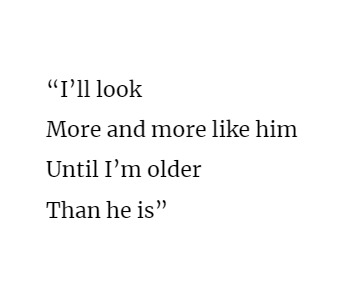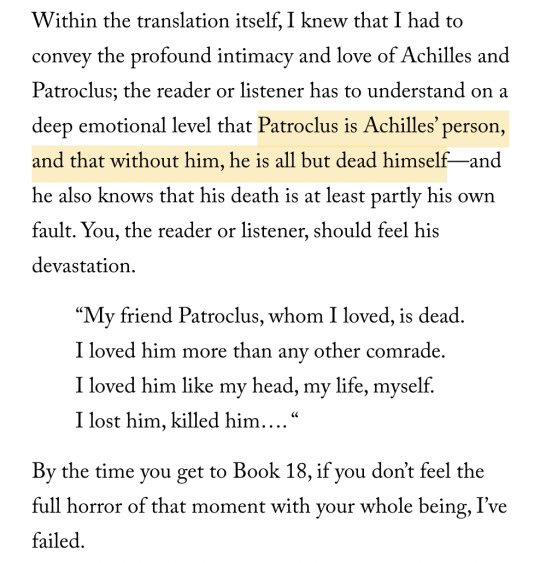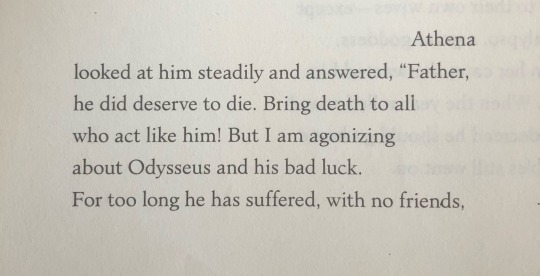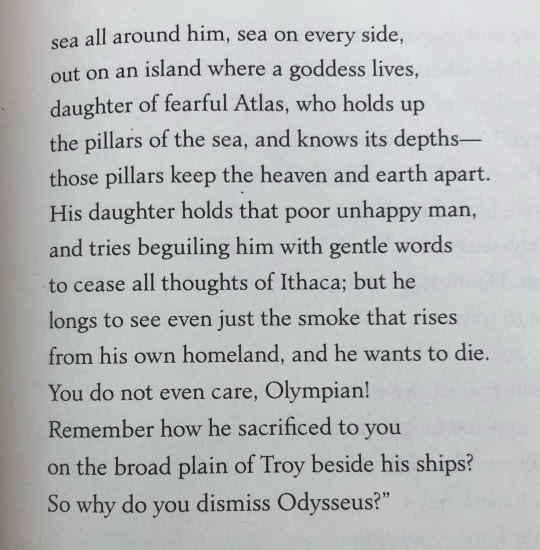#emily wilson
Explore tagged Tumblr posts
Text
Just went to an event with Madeline Miller and Emily Wilson as speakers and got the latter to sign my program and while I was at it I asked. It’s official y’all, EMILY FUCKING WILSON IS A FAN OF EPIC THE MUSICAL
20 notes
·
View notes
Text

Introduction to The Iliad, Emily Wilson
21K notes
·
View notes
Text

from the introduction to emily wilsons translation of the iliad
#the iliad#emily wilson#ancient classics#classic lit#read this over breakfast and couldnt stop thinking abt it while i was at work yesterday#achilles
29K notes
·
View notes
Text























About wocwog HJ. I love him. He's so raw, and there's so much pain and rage.
#web weaving#excerpts#on grief#on rage#on tragedy#poetry#anne carson#fatima aamer bilal#emily wilson#Bilal Al-Shams#Marya Hornbacher#Ada Limón#John Green#Melissa Broder#Audre Lorde#fortesa latifi#Michael Dickman#Ashley Mares#on love#quotes#grief#words
3K notes
·
View notes
Text

Achilles: I-
Odysseus: I think I know more about having ideas than you do, genius
#achilles: agamemnon has dishonored me#odysseus: can you shut the fuck up#odysseus#achilles#the iliad#tagamemnon#homeric epics#emily wilson#homer#emily wilson I love your iliad so much
3K notes
·
View notes
Text
In The Odyssey, Odysseus is extraordinary for the flexibility with which he can inhabit many different names, or no name at all. It is this quality of being multinamed and nameless that enables him to survive. By contrast, almost all the warriors of The Iliad yearn to have a name and a story that lasts forever. Their many names and titles, as sons and brothers and comrades and fathers and rulers, are essential to their identities, their connections with one another, and their fame after death. They fear, above all, being humiliated (cursed with a negative name), or forgotten and nameless. The lists and catalogs of names are essential to the poem’s own work, of memorializing and mourning the dead. Once the bodies return to dust, these syllables are all that remain.
– Emily Wilson, Translator's note for The Iliad.
727 notes
·
View notes
Text

Emily Wilson, in conversation on her translation of The Iliad with Madeline Miller (x)
#this was such a wonderful read i adored her explanation of her usage of 'dog-face' with regards to helen#excited to say ive ordered my copy and cannot wait to devour it !#the iliad#emily wilson#quotes#typography
4K notes
·
View notes
Text
The beautiful word minunthadios, 'short-lived,' is used of both Achilles and Hector, and applies to all of us. We die too soon, and there is no adequate recompense for the terrible, inevitable loss of life. Yet through poetry, the words, actions, and feelings of some long-ago brief lives may be remembered even three thousand years later.
The Iliad, trans. Emily Wilson
#emily wilson you can't do this to me you're killing me I'm going to cry#the iliad#tagamemnon#emily wilson#bern speaks
1K notes
·
View notes
Text
People have been very mean to Emily Wilson online lately. I’ve been on record as saying her translation of the Odyssey (or Iliad) wasn’t my favourite, but do I agree with the accusations of oversimplification or inaccuracy? (Spoiler alert: no.)
#talking about books and stuff#Emily Wilson#translation#cl#Homer cinematic universe#(literally for once!)#tagamemnon
419 notes
·
View notes
Text

emily wilson your MIND
3K notes
·
View notes
Text
You already know the story. You will die. Everyone you love will also die. You will lose them forever. You will be sad and angry. You will weep. You will bargain. You will make demands. You will beg. You will pray. It will make no difference. Nothing you can do will bring them back. You know this. Your knowing changes nothing. This poem will make you understand this unfathomable truth again and again, as if for the very first time.
Emily Wilson, an excerpt of her introduction to The Iliad
851 notes
·
View notes
Text


Athena coming to the defence of Odysseus is very important to me.
#I don’t care how pretty and girlboss Circe and calypso were#he didn’t want them#he said no#he wanted his wife#Athena is a real one#Odysseus#the odyssey#Emily Wilson#Homer
2K notes
·
View notes
Text
"[The Iliad] avoids all the obvious highlights of the traditional story, including the Wooden Horse. It does not start at the beginning — with the Judgment of Paris, the wedding of Peleus and Thetis, the abduction of Helen, or the muster of ships at Aulis — or end with the fall of the city. Instead, the action takes place over a few days in the last year of the war — neither the beginning nor the end. A brief and ostensibly trivial episode — a squabble between two Greek commanders — becomes the subject of a monumental twenty-four-book epic.
Moreover, The Iliad eschews the obvious way for Greeks to tell the Trojan War story: as a conflict between 'us' and 'them.' The Trojans are not dishonest foreigners, despite the fact that Paris abducted his host’s wife. Implausibly, they speak the same language and worship the same gods as the Greeks.
The poem is ancient from our perspective. But it came at the end, not the beginning, of a long poetic tradition. Whoever created The Iliad used the myths, tropes, and techniques developed by many generations of oral poets, and reinvented them to create an extraordinarily original and surprising written epic."
- Emily Wilson, from the introduction to her translation of The Iliad, 2023.
2K notes
·
View notes
Text

of course you have blue hair and epithets 🙄
1K notes
·
View notes
Text

NEW JOHN SILVER/ODYSSEUS PARALLEL DROPPED!
2K notes
·
View notes
Text
Even the smallest of words, like “even” (“per” in Greek), can create enormously consequential interpretive challenges for the translator. In Book 24 of the “Iliad,” the goddess Thetis visits her mortal son, Achilles, who is prostrate with grief for his dead friend, Patroclus. Achilles is still dragging the corpse of Patroclus’s killer, Hector, around the city walls every day, and still refusing to eat, drink or have sex — the normal activities of mortals. The goddess asks her son how long he will “devour” his heart with grief, rather than eating normal bread, and she reminds him that it is also good to have sex, or more literally (as I render it) to “join in love” — “even with a woman.” On the most linguistically straightforward reading, the phrase suggests that his mother thinks Achilles would prefer to join with someone other than a woman — such as Patroclus, his beloved dead friend. This may be a surprise, given that earlier in “The Iliad,” the two men were described as sharing their beds with enslaved women, and they are never described by Homer as having sex with each other — although by the 5th and 4th centuries B.C., readers such as Aeschylus and Plato certainly assumed that they were lovers. Is Thetis suddenly “outing” her son? Or is she simply acknowledging the depth of his desire to be with his dead companion? Translators sometimes leave the word out entirely (Fagles: “It’s a welcome thing to make love with a woman”) or apply the emphasis to the activity, not the partner (Lattimore: “even to lie with a woman”; Caroline Alexander, “Indeed, it is good to lie with a woman”) — although this is not a natural reading of the Greek word order. I do not think it is generally the translator’s job to correct or fight against the text; hence my decision to settle on the simple “even with a woman.” Readers can decide for themselves whether Achilles is yearning to “join” Patroclus in a sexual sense or to mingle with his dear ashes in the tomb.
- Emily Wilson on 5 crucial decisions she made in her ‘Iliad’ translation (link goes to the archive.ph version of the original washington post article due to its paywall)
1K notes
·
View notes